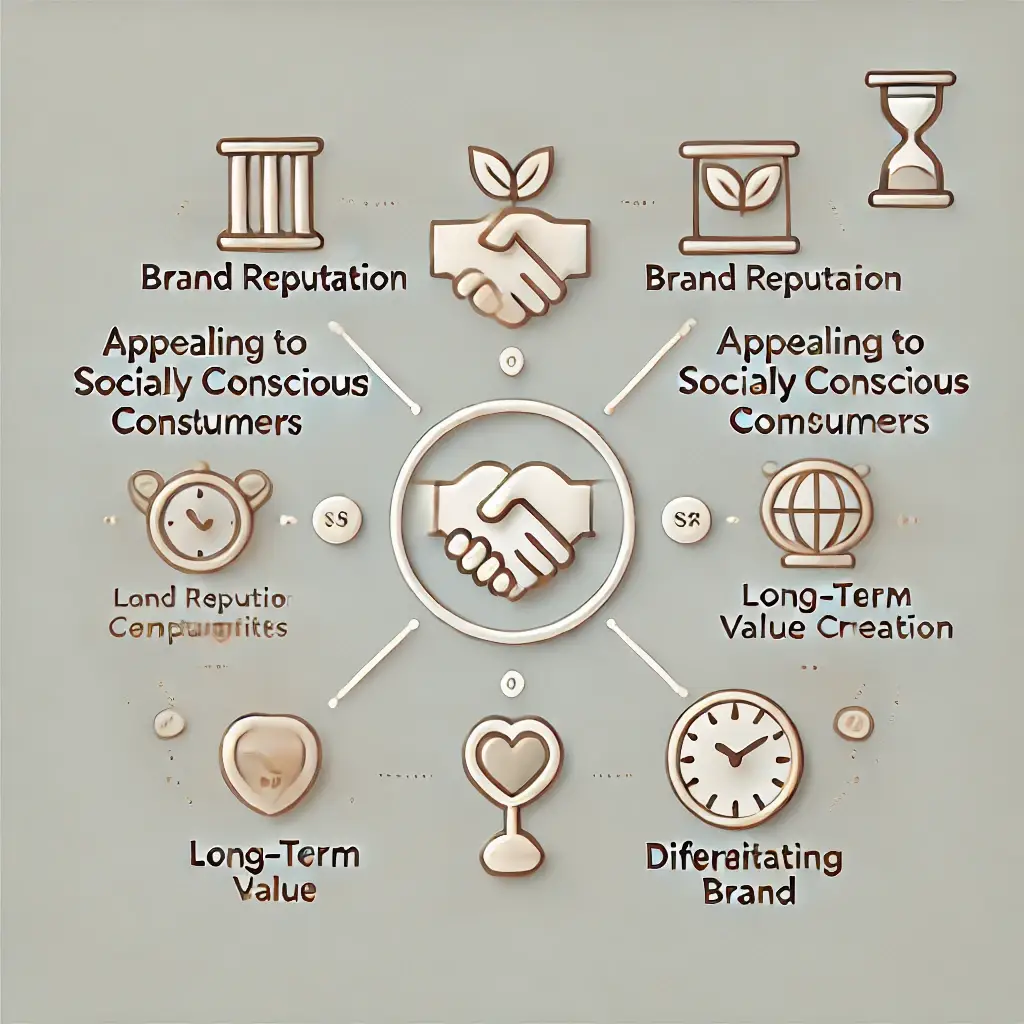Marketing and Corporate Social Responsibility (CSR) are closely related concepts that, when combined, create value not only for businesses but also for society. By integrating CSR into marketing strategies, companies can demonstrate their commitment to ethical values, social responsibility, and environmental stewardship. This approach is often called “sustainable marketing” or “responsible marketing” and reflects a company’s broader purpose beyond profit.
How Marketing and CSR Intersect
- Building Brand Reputation and Trust
- Incorporating CSR into marketing strengthens a brand’s image, showcasing its commitment to positive social and environmental impact.
- Example: Companies like Patagonia and Ben & Jerry’s actively promote their CSR initiatives, such as environmental conservation efforts, which resonate with consumers who value sustainability.
- Appealing to Socially Conscious Consumers
- Today’s consumers, especially millennials and Gen Z, are more inclined to support brands that prioritize sustainability and social responsibility.
- Example: Marketing campaigns that highlight eco-friendly packaging, fair labor practices, or community support programs appeal to socially aware consumers and drive loyalty.
- Enhancing Customer Engagement through Purpose-Driven Campaigns
- CSR provides a platform for meaningful storytelling, enabling companies to engage with customers through causes they care about.
- Example: Dove’s “Real Beauty” campaign emphasizes body positivity and self-esteem, aligning the brand with social values and creating a deeper connection with consumers.
- Long-Term Value Creation
- CSR-driven marketing focuses on building long-term relationships rather than short-term sales, promoting values that align with sustainable growth.
- Example: TOMS Shoes’ “One for One” initiative, where each purchase leads to a donation, reflects a long-term commitment to social impact and reinforces brand loyalty.
- Differentiating the Brand in a Competitive Market
- CSR can set a company apart by highlighting its unique commitment to ethical practices, especially in industries where consumers are concerned about impact, like fashion, technology, and food.
- Example: Brands like Lush and The Body Shop differentiate themselves by emphasizing cruelty-free, eco-friendly products and practices in their marketing.
CSR in Marketing Strategies: Key Components
- Cause-Related Marketing
- A CSR marketing strategy where a company partners with a charity or cause, often linking purchases to donations or support for that cause.
- Example: Nike’s partnership with social causes, like equality campaigns, aligns with its brand values and resonates with its audience.
- Green Marketing
- Focuses on promoting products or practices that minimize environmental harm. Often, companies use green marketing to showcase sustainability efforts in packaging, production, and sourcing.
- Example: IKEA promotes its sustainable sourcing and renewable energy usage as part of its CSR-driven brand identity.
- Ethical Marketing
- Prioritizes transparency, honesty, and consumer respect in marketing efforts. This can include accurate product descriptions, transparent sourcing information, and customer rights advocacy.
- Example: Everlane markets itself as a “radically transparent” fashion brand, disclosing production costs and factory information to promote ethical standards.
- Inclusive Marketing
- Reflects a commitment to diversity and inclusivity in advertising and product offerings. It’s part of a CSR effort to represent and appeal to diverse groups without stereotypes.
- Example: Levi’s promotes diversity and inclusion by featuring people of different backgrounds, identities, and body types in its campaigns.
Benefits of Integrating CSR into Marketing
- Increased Customer Loyalty and Trust: Consumers are more likely to trust brands that demonstrate social responsibility.
- Competitive Advantage: CSR-based marketing differentiates a brand, attracting consumers who prioritize ethical and sustainable practices.
- Positive Impact on Sales: Purpose-driven brands often experience stronger sales, as consumers increasingly support companies that contribute to the greater good.
- Improved Brand Image and Reputation: Consistently integrating CSR into marketing enhances a company’s reputation, fostering a positive public image.
Challenges in Marketing CSR
- Avoiding “Greenwashing”: Companies must ensure their CSR claims are genuine. Consumers are quick to identify and criticize brands that promote CSR superficially without real action.
- Balancing Profit and Purpose: Companies must align CSR with business goals to avoid potential conflicts between profitability and social responsibility.
- Maintaining Consistency: CSR-based marketing requires commitment and consistency across campaigns, which can be challenging in the fast-paced marketing world.
Conclusion
Marketing and CSR, when integrated effectively, create a powerful approach that benefits both businesses and society. Responsible marketing that promotes genuine CSR initiatives can build lasting relationships with consumers, strengthen brand reputation, and contribute to a better world. In today’s socially conscious market, companies that prioritize sustainable and ethical practices in their marketing strategies are likely to see both increased consumer loyalty and positive brand recognition.

